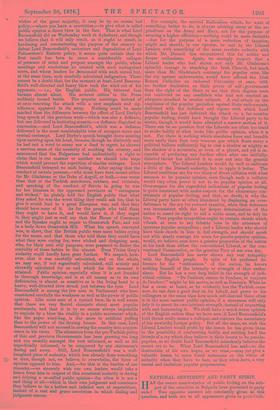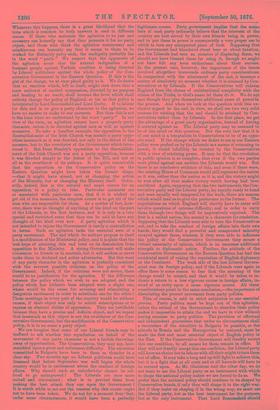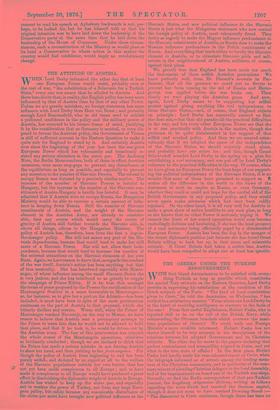NATIONAL SENTIMENT AND PARTY SPIRIT.
IfAS the recent manifestation of public feeling on the sub- ject of the atrocities in Bulgaria been perverted to party ends? Two opposite answers are constantly given to this question, and both are to all appearance given in good-faith.
Whenever this happens, there is a great likelihood that the term which is common to both answers is used in different senses. If those who maintain the agitation to be just and necessary can honestly say that they promote it for no party object, and those who thinIr the agitation unnecessary and mischievous can honestly say that it seems to them to be worked for distinctly party ends, the ambiguity probably lies in the word "party." We suspect that the opponents of the agitation mean that the natural indignation of a humane people against Turkish cruelties is being directed by Liberal politicians against the whole policy of the Con- servative Government in the Eastern Question. If this is the gist of the charge, we at once plead guilty to it. We do desire that an emotion which, left to itself, might sink down into a mere outburst of excited compassion, directed by no purpose and leading to no result, shall become the lever which shall entirely change the policy of England, so far as that policy is interpreted by Lord Beaconsfield and Lord Derby. If to labour for this end is to give a party character to the agitation, we have no answer to make to our accusers. But then this is not in the least what we understand by the word "party." In our view of the term, an agitation cannot have a properly party character, unless it be directed against men as well as against measures. To take a familiar example, the opposition to the disestablishment of the Irish Church was mainly a party oppo- sition inasmuch as it was directed, not only to the defeat of the measure, but to the overthrow of the Government which intro- duced it. But Dean Stanley's opposition to the disestablish- ment of the Irish Church was not a party opposition, because it was directed simply to the defeat of the Bill, and not at all to the overthrow of its authors. It is quite conceivable that the opposition to the Conservative policy on the Eastern Question might have taken the former shape, —that it might have aimed, not at changing the action of the Ministry, but at changing the Ministry itself. Ordin- arily, indeed, this is the natural and usual course for an opposition to a policy to take. Particular measures are so associated with particular men, that if it is wished to get rid of the measures, the simplest course is to get rid of the men who are responsible for them. As a matter of fact, how- ever, there was no thought of anything of the kind on the part of the Liberals, in the first instance, and it is only in a very special and restricted sense that they can be said to have any thought of the kind even now. A party agitation which is not intended to injure the Government is surely a contradiction in terms. Such an agitation lacks the essential note of a party movement. The end which its authors propose to itself is a modification of the Ministerial policy, and it is plain that the best hope of attaining this end rests on its dissociation from opposition to the Ministry. A strong Government will make concession to friends or to neutrals, but it will seldom or never make them to declared and active adversaries. But this want of any party character in the agitation is perfectly consistent with the severest possible criticism on the policy of the Government. Indeed, if the criticism were not severe, there would be no justification for the agitation. If the difference between the policy which we wish to see adopted and the policy which has hitherto been adopted were a slight one, where would be the cause for arousing and stimulating a dangerous excitement in order to substitute one for the other? These meetings in every part of the country would be without excuse, if their object was only to solicit subscriptions or to express an abstract dislike of oppression. They are justifiable because they have a precise and definite object, and we repeat that inasmuch as this object is not the overthrow of the Con- servative Government, but the modification of the Conservative poliey, it is in no sense a party object. We can imagine that some of our Liberal friends may be inclined to ask whether this repudiation on behalf of the movement of any party character is not a foolish throwing- away of opportunities. The Conservatives, they may say, have stumbled upon a great and unforeseen difficulty. The atrocities committed in Bulgaria have been to them as thunder in a clear sky. Two months ago no Liberal politician could have dreamed that before September was well begun the whole country would be in excitement about the conduct of foreign affairs. Why should such an unlooked-for chance be suf- fered to go unimproved? The Liberals are once more united and determined ; what is to prevent them from making the best attack they can upon the Government It is worth while to set out the reasons why this course ought not to have been taken. We do not for a moment deny that, under some circumstances, it would have been a perfectly
legitimate course. Party government implies that the mem- bers of each party ordinarily believe that the interests of the country are best served by their own friends being in power, and to put them in power is consequently a very proper use to which to turn any unexpected piece of luck. Supposing that the Government had blundered about beer or about taxation, and the Liberals had seen an occasion of displacing them, we should not have blamed them for using it, though we might not have felt any keen enthusiasm about their success. In the present ease, however, the importance of the issues involved altogether transcends ordinary party considerations. In comparison with the attainment of the end, it becomes a matter of absolutely no moment whether it is attained by Con- servatives or by Liberals. If the Conservatives will redeem England from the shame of unintentional complicity with the crimes of the Turks, in God's name let them do it. We do not care though they give themselves additional years of powerin the process. And when we look at the question with this ex- clusive regard to the end in view, we shall see two very solid reasons for wishing that the end should be attained by Con- servatives rather than by Liberals. In the first place, we get the advantage of a great party organisation, instead of having it arrayed against us. The Liberal party may be assumed to be of one mind on this question. But the very fact that it is of one mind is a temptation to Conservatives to be of an oppo- site mind. If the change which we desire to see in our Eastern policy were pushed on by the Liberals as a means of returning to power, it would infallibly be resisted by the Conservatives with a view of retaining power. It may be that the revolution in public opinion is so complete, that even if the two parties were pitted against one another the Liberals would win. But there is no conclusive evidence of this, and even if there were, the existing House of Commons would still represent the nation as it was, rather than the nation as it is, and the victory might be won after all that makes victory worth having had been sacrificed. Again, supposing that the two instruments, the Con- servative party and the Liberal party, lay equally ready to hand and were equally well tempered for the work, there are reasons which would lead us to give the preference to the former. The negotiations on which England will shortly have to enter will involve questions of extreme difficulty, and in order to carry them through two things will be imperatively required. The first is a united nation, the second is a character for resolution. Supposing that the Liberals were able to turn the Conservatives out, and to take the conduct of foreign affairs into their own hands, they would find a powerful and exasperated minority arrayed against them, whereas if they were able to influence the policy of the Conservative Government they secure a virtual unanimity of opinion, which is an immense additional strength to diplomatic action. Further, the attitude of the Conservative Government on the Eastern Question has had the accidental merit of raising the reputation of English diplomacy on the Continent. The weak side of the last Liberal Govern- ment was its foreign policy, and if the Liberals were again in office there is some reason to fear that the meaning of the change would be missed, and that it would be taken to in- dicate a return to a less vigorous course in foreign affairs, in- stead of an entry upon a more vigorous course. All these considerations point to the same conclusion,—the importance of dissociating the present movement from party politics. This, of course, is said in strict subjection to one essential proviso. Party politics must be kept out of this agitation, unless the refusal of the Government to abandon their policy makes it impossible to attain the end we have in view without having recourse to party politics. The provision of effectual and independent guarantees that under no circumstances shall a recurrence of the atrocities in Bulgaria be possible, or the misrule in Bosnia and the Herzegovina be restored, must be made the first and most essential object of English policy in the East. If the Conservative Government will frankly accept this one condition, by all means let them remain in office. If they will not frankly accept this one condition, the Liberal party will have no choice butte labour with all their might to turn them out of office. It may take a long and up-hill fight to achieve this, but it is a fight that at all costs and at all hazards will have to be entered upon. As Mr. Gladstone said the other day, we do not want to use the Liberal party as an instrument with which to shape the national policy unless we are forced to do so. We prefer that the national policy should continue to be shaped by Conservative hands, if only they will shape it in the right way. But if they insist on shaping it in the wrong way, we must use the Liberal party, not as the best instrument for the purpose, but as the only instrument. That Lord Beaconsfield should consent to read his speech at Aylesbury backwards is not, per- haps, to be looked for, but he has himself told us that his original intention was to have laid down the leadership of the Conservative party at the same time that he laid down the leadership of the House of Commons. Under these circum- stances, such a reconstruction of the Ministry as would place at its head a Conservative in whose action in this matter the country would feel confidence, would imply no revolutionary change.




































 Previous page
Previous page